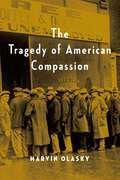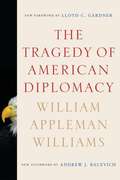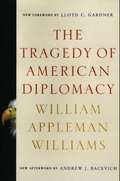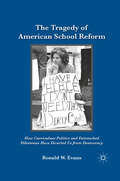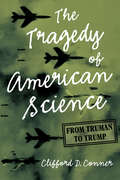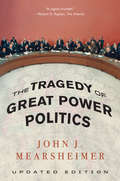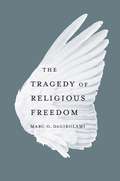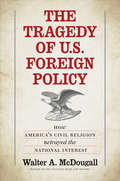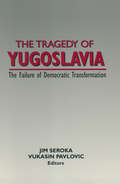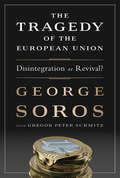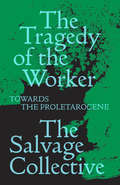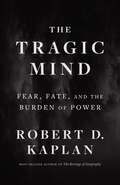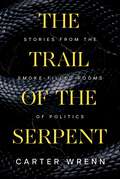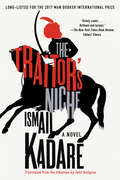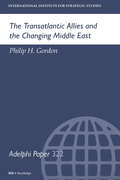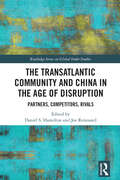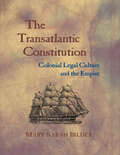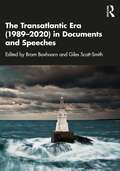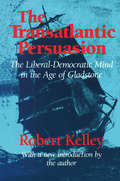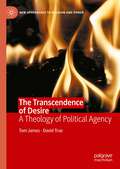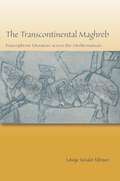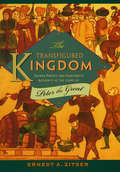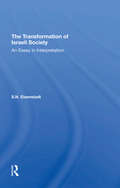- Table View
- List View
The Tragedy of American Compassion
by Marvin OlaskyCan a man be content with a piece of bread and some change tossed his way from a passerby? Today's modern welfare state expects he can. Those who control the money in our society think that giving a dollar at the train station and then appropriating a billion dollars for federal housing can cure the ails of the homeless and the poor. But the crisis of the modern welfare state is more than a crisis of government. Private charities that dispense aid indiscriminately while ignoring the moral and spiritual needs of the poor are also to blame. Like animals in the zoo at feeding time, the needy are given a plate of food but rarely receive the love and time that only a person can give. Poverty fighters 100 years ago were more compassionate--in the literal meaning of "suffering with"--than many of us are now. They opened their own homes to deserted women and children. They offered employment to nomadic men who had abandoned hope and human contact. Most significantly, they made moral demands on recipients of aid. They saw family, work, freedom, and faith as central to our being, not as life-style options. No one was allowed to eat and run. Some kind of honest labor was required of those who needed food or a place to sleep in return. Woodyards next to homeless shelters were as common in the 1890s as liquor stores are in the 1990s. When an able bodied woman sought relief, she was given a seat in the "sewing room" and asked to work on garments given to the helpless poor. To begin where poverty fighters a century ago began, Marvin Olasky emphasizes seven ideas that recent welfare practice has put aside: affiliation, bonding, categorization, discernment, employment, freedom, and most importantly, belief in God. In the end, not much will be accomplished without a spiritual revival that transforms the everyday advice we give and receive, and the way we lead our lives. It's time we realized that there is only so much that public policy can do. That only a richness of spirit can battle a poverty of soul. The century-old question--does any given scheme of help... make great demands on men to give themselves to their brethren?--is still the right one to ask. Most of our 20th-century schemes have failed. It's time to learn from the warm hearts and hard heads of the 19th-century.
The Tragedy of American Diplomacy
by Andrew J. Bacevich William Appleman Williams Lloyd Gardner Lloyd C. GardnerThis incisive interpretation of American foreign policy ranks as a classic in American thought. First published in 1959, the book offered an analysis of the wellsprings of American foreign policy that shed light on the tensions of the Cold War and the deeper impulses leading to the American intervention in Vietnam. William Appleman Williams brilliantly explores the ways in which ideology and political economy intertwined over time to propel American expansion and empire in the nineteenth and twentieth centuries. The powerful relevance of Williams's interpretation to world politics has only been strengthened by recent events in Central Asia and the Persian Gulf. Williams allows us to see that the interests and beliefs that once sent American troops into Texas and California, or Latin America and East Asia, also propelled American forces into Iraq.
The Tragedy of American Diplomacy (50th Anniversary Edition)
by Andrew J. Bacevich William Appleman Williams Lloyd C. Gardner"A brilliant book on foreign affairs."--Adolf A. Berle Jr., New York Times Book Review This incisive interpretation of American foreign policy ranks as a classic in American thought. First published in 1959, the book offered an analysis of the wellsprings of American foreign policy that shed light on the tensions of the Cold War and the deeper impulses leading to the American intervention in Vietnam. William Appleman Williams brilliantly explores the ways in which ideology and political economy intertwined over time to propel American expansion and empire in the nineteenth and twentieth centuries. The powerful relevance of Williams's interpretation to world politics has only been strengthened by recent events in Central Asia and the Persian Gulf. Williams allows us to see that the interests and beliefs that once sent American troops into Texas and California, or Latin America and East Asia, also propelled American forces into Iraq.
The Tragedy of American Diplomacy (50th Anniversary Edition)
by William Appleman WilliamsThe book offers an analysis of the wellsprings of American foreign policy that shed light on the tensions of the Cold War and the deeper impulses leading to the American intervention in Vietnam.
The Tragedy of American School Reform
by Ronald W. EvansTwo persistent dilemmas haunt school reform: curriculum politics and classroom constancy. Both undermined the 1960s' new social studies, a dynamic reform movement centered on inquiry, issues, and social activism. Dramatic academic freedom controversies ended reform and led to a conservative restoration. On one side were teachers and curriculum developers; on the other, conservative activists determined to undo the revolutions of the 1960s. The episode brought a return to traditional history, a turn away from questioning, and the re-imposition of authority. Engagingly written and thoroughly researched, The Tragedy of American School Reform offers a provocative perspective on current trends.
The Tragedy of American Science: From Truman to Trump
by Clifford D. ConnerA look at the destructive history of science-for-profit, including its toll on the US pandemic response, by the author of A People&’s History of Science. Despite a facade of brilliant technological advances, American science has led humanity to the brink of interrelated disasters. In The Tragedy of American Science, historian of science Clifford D. Conner describes the dual processes by which this history has unfolded since the Second World War, addressing the corporatization and the militarization of science in the US. He examines the role of private profit considerations in determining the direction of scientific inquiry—and the ways those considerations have dangerously undermined the integrity of sciences impacting food, water, air, medicine, and the climate. In addition, he explores the relationship between scientific industries and the US military, discussing the innumerable financial and human scientific resources that have been diverted from other critical areas in order to further military aggrandizement and technological development. While the underlying problems may appear intractable, Conner compellingly argues that replacing the current science-for-profit system with a science-for-human-needs system is not an impossible utopian dream—and the first step to a better future is grappling with the mistakes of the past.
The Tragedy of Great Power Politics
by John Mearsheimer"A superb book....Mearsheimer has made a significant contribution to our understanding of the behavior of great powers."--Barry R. Posen, The National Interest The updated edition of this classic treatise on the behavior of great powers takes a penetrating look at the question likely to dominate international relations in the twenty-first century: Can China rise peacefully? In clear, eloquent prose, John Mearsheimer explains why the answer is no: a rising China will seek to dominate Asia, while the United States, determined to remain the world's sole regional hegemon, will go to great lengths to prevent that from happening. The tragedy of great power politics is inescapable.
The Tragedy of Religious Freedom
by Marc O. DegirolamiWhen it comes to questions of religion, legal scholars face a predicament. They often expect to resolve dilemmas according to general principles of equality, neutrality, or the separation of church and state. But such abstractions fail to do justice to the untidy welter of values at stake. Offering new views of how to understand and protect religious freedom in a democracy, The Tragedy of Religious Freedom challenges the idea that matters of law and religion should be referred to far-flung theories about the First Amendment. Examining a broad array of contemporary and more established Supreme Court rulings, Marc DeGirolami explains why conflicts implicating religious liberty are so emotionally fraught and deeply contested. Twenty-first-century realities of pluralism have outrun how scholars think about religious freedom, DeGirolami asserts. Scholars have not been candid enough about the tragic nature of the conflicts over religious liberty-the clash of opposing interests and aspirations they entail, and the limits of human reason to resolve intractable differences. The Tragedy of Religious Freedom seeks to turn our attention from abstracted, absolute values to concrete, historical realities. Social history, characterized by the struggles of lawyers engaged in the details of irreducible conflicts, represents the most promising avenue to negotiate legal conflicts over religion. In this volume, DeGirolami offers an approach to understanding religious liberty that is neither rigidly systematic nor ad hoc, but a middle path grounded in a pluralistic and historically informed perspective.
The Tragedy of U.S. Foreign Policy: How America's Civil Religion Betrayed the National Interest
by Walter A. McdougallA fierce critique of civil religion as the taproot of America's bid for global hegemony Pulitzer Prize-winning historian Walter A. McDougall argues powerfully that a pervasive but radically changing faith that "God is on our side" has inspired U. S. foreign policy ever since 1776. The first comprehensive study of the role played by civil religion in U. S. foreign relations over the entire course of the country's history, McDougall's book explores the deeply infused religious rhetoric that has sustained and driven an otherwise secular republic through peace, war, and global interventions for more than two hundred years. From the Founding Fathers and the crusade for independence to the Monroe Doctrine, through World Wars I and II and the decades-long Cold War campaign against "godless Communism," this coruscating polemic reveals the unacknowledged but freely exercised dogmas of civil religion that bind together a "God blessed" America, sustaining the nation in its pursuit of an ever elusive global destiny.
The Tragedy of Yugoslavia: The Failure of Democratic Transformation
by Jim Seroka Vukasin PavlovicOnce it was hoped that the Yugoslav federation might manage to defy the odds once more, this time to become one of the world's few examples of democratic pluralism. Instead, we are witnessing another Balkan tragedy. What went wrong? In this volume scholars from Croatia, Serbia, and Slovenia examine the Janus face of pluralism, with case studies of electoral politics in the republics and of what were once the country's institutions of integration - the League of Communists, the managerial elite, and the army. Among the contributors are Mirjana Kaspovic, Tomaz Masmak, Vesna Pusic, Anton Bebler, Ivan Siber, Vucina Vasovic, and the editors.
The Tragedy of the European Union: Disintegration or Revival?
by George Soros Gregor SchmitzThe European Union could soon be a thing of the past. Xenophobia is rampant and commonly reflected in elections across the continent. Great Britain may hold a referendum on whether to abandon the union altogether. Spurred by anti-EU sentiments due to the euro crisis, national interests conflict with a shared vision for the future of Europe. Is it too late to preserve the union that generated unprecedented peace for more than half a century?This is no mere academic question with limited importance for America and the rest of the world. In the past decade, the EU has declined from a unified global power to a fractious confederation of states with staggering unemployment resentfully seeking relief from a reluctant Germany. If the EU collapses and the former member states are transformed again from partners into rivals, the US and the world will confront the serious economic and political consequences that follow.In a series of revealing interviews conducted by Dr. Gregor Peter Schmitz, George Soros-a man of vast European experience whose personal past informs his present concerns-offers trenchant commentary and concise, prescriptive advice: The euro crisis was not an inevitable consequence of integration, but a result of avoidable mistakes in politics, economics, and finance; and excessive faith in the self-regulating financial markets that Soros calls market fundamentalism inspired flawed institutional structures that call out for reform. Despite the considerable perils of this period, George Soros maintains his faith in the European Union as a model of open society. This book is a testament to his vision for a peaceful and productive Europe.
The Tragedy of the Middle East
by Barry RubinAnalyzes the failures to establish direction in the Middle East
The Tragedy of the Worker: Towards the Proletarocene (Salvage Editions)
by Jamie AllinsonFacing irreversible climate change, the planet is en route to apocalypse To understand the scale of what faces us and how it ramifies through every corner of our lives is to marvel at our inaction. Why aren&’t we holding emergency meetings in every city, town and village every week? What is to be done to create a planet where a communist horizon offers a new dawn to replace our planetary twilight? What does it mean to be a communist after we have hit a climate tipping point? The Tragedy of the Worker is a brilliant, stringently argued pamphlet reflecting on capitalism&’s death drive, the left&’s complicated entanglements with fossil fuels, and the rising tide of fascism. In response, the authors propose Salvage Communism, a programme of restoration and reparation that must precede any luxury communism. They set out a new way to think about the Anthropocene. The Tragedy of the Worker demands an alternative future—the Proletarocene—one capable of repairing the ravages of capitalism and restoring the world.
The Tragic Mind: Fear, Fate, and the Burden of Power
by Robert D. KaplanA moving meditation on recent geopolitical crises, viewed through the lens of ancient and modern tragedy “Classical drama provides crucial lessons for policymakers. . . . A road map for effective, well-considered policy.”—Kirkus Reviews Some books emerge from a lifetime of hard-won knowledge. Robert D. Kaplan has learned, from a career spent reporting on wars, revolutions, and international politics in Europe, the Middle East, and East Asia, that the essence of geopolitics is tragedy. In The Tragic Mind, he employs the works of ancient Greek dramatists, Shakespeare, German philosophers, and the modern classics to explore the central subjects of international politics: order, disorder, rebellion, ambition, loyalty to family and state, violence, and the mistakes of power. The great dilemmas of international politics, he argues, are not posed by good versus evil—a clear and easy choice—but by contests of good versus good, where the choices are often searing, incompatible, and fraught with consequences. A deeply learned and deeply felt meditation on the importance of lived experience in conducting international relations, this is a book for everyone who wants a profound understanding of the tragic politics of our time.
The Trail of the Serpent: Stories from the Smoke-Filled Rooms of Politics
by Carter WrennPolitics is a mess—what&’s the cure?After living through WWII, Americans watched Soviet tanks roll into Saigon in 1975—we lost the Vietnam War. That changed politics. And Ronald Reagan was elected president. The Berlin Wall fell, the Soviet Union collapsed, we won the Cold War, threats vanished. That changed politics again. Washington politicians traded favors. Wall Street boomed. Working families staring at stacks of unpaid bills struggled to make ends meet. A reality TV star ran for president, won; coronavirus struck, Trump fumbled. Biden beat Trump. Politics is a mess—what&’s the cure? Carter Wrenn tells stories you don&’t often get to read about politics and politicians in The Trail of the Serpent.
The Traitor's Niche: A Novel
by Ismail Kadare"Kadare is inevitably linked to Orwell and Kundera, but he is a far deeper ironist than the first, and a better storyteller than the second. He is a compellingly ironic storyteller because he so brilliantly summons details that explode with symbolic reality." —The New YorkerAt the heart of the Ottoman Empire, in the main square of Constantinople, a niche is carved into ancient stone. Here, the sultan displays the severed heads of his adversaries. People flock to see the latest head and gossip about the state of the empire: the province of Albania is demanding independence again, and the niche awaits a new trophy . . . Tundj Hata, the imperial courier, is charged with transporting heads to the capital—a task he relishes and performs with fervor. As he travels through obscure and impoverished territories, he makes money from illicit side–shows, offering villagers the spectacle of death. The head of the rebellious Albanian governor would fetch a very high price indeed. The Traitor's Niche is a surreal tale of tyranny and rebellion, in a land where armies carry scarecrows, state officials ban entire languages, and the act of forgetting is more complicated than remembering.Long-listed for the 2017 Man Booker International Prize"The name of the Albanian novelist Ismail Kadare regularly comes up at Nobel Prize time, and he is still a good bet to win it one of these days . . . He is seemingly incapable of writing a book that fails to be interesting." —The New York Times
The Transatlantic Allies and the Changing Middle East (Adelphi series #322)
by Philip H GordonSince the mid-1990s, US and European attitudes, strategies and policies towards the Middle East have diverged. In the Middle East peace process, Europeans have grown frustrated with the lack of progress and with Washington’s near-monopoly on diplomatic action, and have begun to demand a greater role. On Iraq, the US insists on strong military and economic containment of Saddam Hussein, while some Europeans have started to press for a more rapid reintegration of Iraq into the international community and are reluctant to use or threaten force. The issue of how to deal with Iran has been most divisive of all, with the US and Europe deeply divided over whether they should contain, or engage, Tehran. Transatlantic tensions over the Middle East are damaging for three main reasons. They reduce the effectiveness of allied policies; undermine NATO’s cohesion when its future is no longer guaranteed by a common threat; and threaten to spill over into the economic domain. This paper examines the reasons for these potentially damaging differences, assesses the prospects for improving transatlantic cooperation in the region and suggests approaches that may help to bring this about. Its main policy conclusions are:On the Arab–Israeli conflict, as long as the peace process is moving forward, or has reasonable prospects of doing so, the US is probably right that Europe’s formal involvement in direct peace talks would not be helpful, particularly if such a role aimed to promote policies different from those of the US. If the peace process stalls completely, however, it will be difficult for Washington to justify opposing a more active European role. On Iraq, the US-led policy of containment is correct, and economic sanctions should remain in place until Baghdad complies fully with UN Security Council disarmament resolutions. However, in exchange for Europe’s agreement to contribute to Iraq’s military containment, the US, like Europe, should abide by the letter and spirit of these resolutions, even if this means agreeing to lift restrictions on oil exports if Iraq complies in full. Failing to do so could undermine global support for the integrity of the UN system, ultimately leaving the US, and perhaps the UK, isolated in maintaining a policy that might not be sustainable in the long term. On Iran, a transatlantic compromise would need to include an agreement by the US not to impose sanctions against European companies doing business with Iran, as long as Europe offered unstinting support in combating terrorism and helping to contain the development of weapons of mass destruction. The US should also seek agreement with the European Union on which Iranian actions would justify sanctions or other punitive measures.The paper concludes by examining institutional changes that might help to promote transatlantic cooperation on the Middle East.
The Transatlantic Community and China in the Age of Disruption: Partners, Competitors, Rivals (Routledge Series on Global Order Studies)
by Joe Renouard Daniel S. HamiltonThis volume analyzes what China’s rise means for the transatlantic community in a new age of disruption—an age marked by great power rivalry, technological upheavals, and the diffusion of power.The book explores how today’s conditions—including heightened Western concerns about Chinese influence operations, Chinese efforts to manipulate critical economic interconnections and dependencies, rapid technological advances, the Russia–China entente, and growing linkages between North Atlantic and Indo-Pacif ic security—have forced Western actors to adopt a more differentiated approach. In this great power competition, they must decide how and where to work with China as an important partner, how to address China’s competitive challenges, and how to address China’s efforts to forge a set of norms and institutions to challenge the open, rules-based international system.The book will be of key interest to students and scholars of Transatlantic Relations, International Relations, Global Governance, European Politics, Asian Security, US and EU Foreign Policy, and Sino-Western relations. It will also be of interest to think-tank researchers and policy practitioners.
The Transatlantic Constitution: Colonial Legal Culture and the Empire
by Mary Sarah Bilder“One of the more significant recent pieces of scholarship in this area . . . essential reading for all students of early America.” —Journal of American History Departing from traditional approaches to colonial legal history, Mary Sarah Bilder argues that American law and legal culture developed within the framework of an evolving, unwritten transatlantic constitution that lawyers, legislators, and litigants on both sides of the Atlantic understood. The central tenet of this constitution—that colonial laws and customs could not be repugnant to the laws of England but could diverge for local circumstances—shaped the legal development of the colonial world.Focusing on practices rather than doctrines, Bilder describes how the pragmatic and flexible conversation about this constitution shaped colonial law: the development of the legal profession; the place of English law in the colonies; the existence of equity courts and legislative equitable relief; property rights for women and inheritance laws; commercial law and currency reform; and laws governing religious establishment. Using as a case study the corporate colony of Rhode Island, which had the largest number of appeals of any mainland colony to the English Privy Council, she reconstructs a largely unknown world of pre-Constitutional legal culture.“The book is rich in social history as well, with the evolving status of women and institutional religion providing much of the legal grist.” —Choice
The Transatlantic Era (1989–2020) in Documents and Speeches
by Bram BoxhoornThis accessible textbook uses key documents embedded in a clear narrative to chart the post-Cold War rise and decline of transatlantic relations. It provides a novel interpretive framework by proposing that the three decades between 1989 and 2020 represent a distinct ‘transatlantic era’. Providing a unique new look at the recent history and politics of transatlantic relations, the book argues that three key phases can be identified: 1989–1999: victory? 2000–2010: divergence? 2011–2020: disarray? Each period defines a particular set of political, economic, and security dynamics, with the trend being a gradual undermining of the strengths on which transatlantic unity once relied. These three decades therefore represent both the high point of the transatlantic region’s power and potential, and its gradual decline in a global context. Presenting students with a critical perspective of US and European transatlantic policies through annotated key documents covering central aspects of security, political, economic, and cultural affairs, it will be essential reading on all International Relations courses as well as of great interest to scholars and students of US and European Studies, Foreign Policy, and Security Studies.
The Transatlantic Persuasion: Liberal-Democratic Mind in the Age of Gladstone
by Robert KelleyThis pioneering work is the basic and largely unmatched study of the single transatlantic community of thought shared by nineteenth century British and Canadian Liberals and American Democrats. The result of more than ten years of comparative research, The Transatlantic Persuasion explores the roots of those ideas that comprise a coherent Liberal-Democratic worldview: ideas about society, human relations, the economy, equality, liberty, the ethnocultural dimension of life, the proper role and nature of government and the world community.
The Transcendence of Desire: A Theology of Political Agency (New Approaches to Religion and Power)
by Tom James David TrueThe “secular age” is not a smooth, untroubled process of accumulation and advance but an uneven and unpredictable series of clashes of interest. Charles Taylor’s “immanent frame” cannot be construed merely as a phenomenon within religion and culture but urgently needs to be understood in political and economic terms–i.e., as a class project. The failure of the secular, vividly displayed in the crumbling legitimacy of global institutions and in the spectacle of police violence, both calls for and makes possible a renewal of political agency. Tom James and David True argue that a theology of the cross has a distinctive potential today: it can pierce the sacred aura of normalcy around the consensual anti-politics of the neoliberal order so that a vision of a world beyond today’s racialized capitalism can emerge. But they contend that we don’t need to forsake the emancipatory aims of modernity nor retreat to local communities. As an alternative to these weak strategies, they offer a constructive and cruciform account of political agency that includes both prophetic resistance and practical wisdom, each embedded in contemporary struggles for freedom that, they argue, embody divine desire for a common world.
The Transcontinental Maghreb: Francophone Literature across the Mediterranean
by Edwige Tamalet TalbayevThe writer Gabriel Audisio once called the Mediterranean a “liquid continent.” Taking up the challenge issued by Audisio’s phrase, Edwige Tamalet Talbayev insists that we understand the region on both sides of the Mediterranean through a “transcontinental” heuristic. Rather than merely read the Maghreb in the context of its European colonizers from across the Mediterranean, Talbayev compellingly argues for a transmaritime deployment of the Maghreb across the multiple Mediterranean sites to which it has been materially and culturally bound for millennia.The Transcontinental Maghreb reveals these Mediterranean imaginaries to intersect with Maghrebi claims to an inclusive, democratic national ideal yet to be realized. Through a sustained reflection on allegory and critical melancholia, the book shows how the Mediterranean decenters postcolonial nation-building projects and mediates the nomadic subject’s reinsertion into a national collective respectful of heterogeneity. In engaging the space of the sea, the hybridity it produces, and the way it has shaped such historical dynamics as globalization, imperialism, decolonization, and nationalism, the book rethinks the very nature of postcolonial histories and identities along its shores.
The Transfigured Kingdom: Sacred Parody and Charismatic Authority at the Court of Peter the Great (Studies of the Harriman Institute)
by Ernest A. ZitserIn this richly comparative analysis of late Muscovite and early Imperial court culture, Ernest A. Zitser provides a corrective to the secular bias of the scholarly literature about the reforms of Peter the Great. Zitser demonstrates that the tsar's supposedly "secularizing" reforms rested on a fundamentally religious conception of his personal political mission. In particular, Zitser shows that the carnivalesque (and often obscene) activities of the so-called Most Comical All-Drunken Council served as a type of Baroque political sacrament—a monarchical rite of power that elevated the tsar's person above normal men, guaranteed his prerogative over church affairs, and bound the participants into a community of believers in his God-given authority ("charisma"). The author suggests that by implicating Peter's "royal priesthood" in taboo-breaking, libertine ceremonies, the organizers of such "sacred parodies" inducted select members of the Russian political elite into a new system of distinctions between nobility and baseness, sacrality and profanity, tradition and modernity.Tracing the ways in which the tsar and his courtiers appropriated aspects of Muscovite and European traditions to suit their needs and aspirations, The Transfigured Kingdom offers one of the first discussions of the gendered nature of political power at the court of Russia's self-proclaimed "Father of the Fatherland" and reveals the role of symbolism, myth, and ritual in shaping political order in early modern Europe.
The Transformation Of Israeli Society: An Essay In Interpretation
by S. N. Eisenstadt S N EisenstadtThis book discusses the development and organization of the major spheres of life of Israeli society. It analyses major aspects and trends of development of Israeli society which have been taking place continuously since its beginning, from the early period of Zionist settlement in Eretz Israel.
